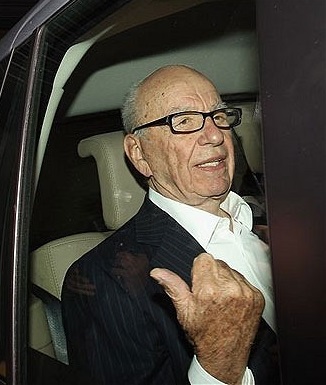Murdoch steps back
 Rupert Murdoch, a media titan known for his far-reaching influence, is stepping down.
Rupert Murdoch, a media titan known for his far-reaching influence, is stepping down.
At 92 years old, his departure leaves many wondering if the empire he leaves behind is one of success or scandal.
Over the decades, Murdoch crafted an empire that included Australia's major newspapers, Britain's infamous tabloids, and powerful American outlets like Fox News.
His fingerprints on the media world are undeniable, stretching back to his inheritance of an Adelaide newspaper in the 1950s.
While he boasts remarkable business achievements, his legacy is marred by scandals, including the UK phone-hacking debacle and Fox News's role in promoting election conspiracies, resulting in a hefty payment to Dominion Voting Systems.
Former Australian prime ministers, including Kevin Rudd and Malcolm Turnbull, have long called for a Murdoch Royal Commission to probe News Corp's sway in Australia.
But not much may change as a result of Rupert’s announcement, as he remains News Corp and Fox's ‘Chairman Emeritus’, an honorary role that maintains his involvement in the ideological fray.
His heir, Lachlan Murdoch, will step into the spotlight as the sole chair of News Corp and Fox.
In a letter to his staff, Rupert Murdoch asserted his continued participation in the “contest of ideas”, highlighting his devotion to “freedom”, a sentiment shared by his son Lachlan. Their media reign, the comments highlight, is not just about wealth but also about political influence.
Scepticism surrounds Lachlan's ability to match his father's ruthless determination.
NPR's David Folkenflik suggests that Lachlan lacks the same relentless drive, likely making him more of a manager than a power broker.
The world may witness a shift toward more conservative content, but it remains unclear if Lachlan can match Rupert's audacious media empire.
The 92-year-old media tycoon leaves behind a trail of media domination and controversy spanning seven decades. His empire, known for tabloid sensationalism and conservative commentary, has etched its place in journalism, politics, and pop culture.
In the 1950s, a young Murdoch inherited The News of Adelaide, a modest newspaper in Australia.
By the 1960s, he expanded with local newspaper acquisitions, such as The Sunday Times and The Daily Mirror, and founded The Australian, a national newspaper. His influence stretched to the UK with the purchase of The News of the World and The Sun in 1969.
In the 1970s, Murdoch entered the US media market, acquiring The San Antonio Express and The San Antonio News. He ventured into television with the purchase of The New York Post and expanded his British holdings with The Times and The Sunday Times.
The 1980s marked a turning point as he acquired 20th Century-Fox and launched the Fox broadcast network, introducing iconic shows like ‘The Simpsons’ and ‘The X-Files’. The decade was also marred by labour disputes as he shifted newspaper printing technology.
The 1990s saw the establishment of Foxtel and Sky News Australia. In 1996, Murdoch launched the polarising Fox News, a conservative powerhouse.
The 2000s brought ventures into digital media, including the ill-fated Myspace acquisition and the $5 billion purchase of Dow Jones & Company, parent to The Wall Street Journal.
James Murdoch's role in the phone-hacking scandal led to the closure of The News of the World in 2011.
In 2012, Rupert split his empire into News Corp and 20th Century Fox. Disney acquired most of 21st Century Fox's assets in 2019, leaving Fox Corp as the remaining entity.
James Murdoch's departure from News Corp in 2020 signalled tensions over editorial content. In 2023, Rupert faced a lawsuit over Fox News's election coverage, settling for $787.5 million. His retirement now hands the reins to his son, Lachlan Murdoch.
The transition may not bring immediate change, but differences between the two suggest a shift toward more conservatism.
Rupert's passion for newspapers contrasts with a post-print era, while Lachlan may intensify the outlets' radical, nationalist content.








 Print
Print